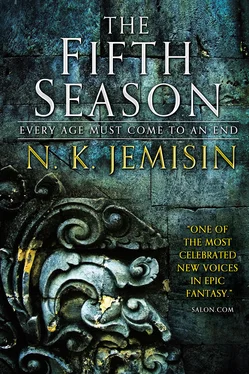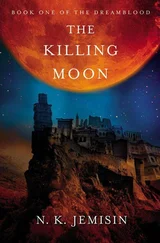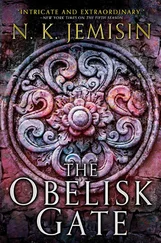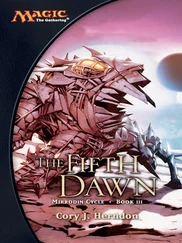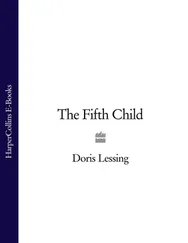The thought of keys and money makes Damaya curl in on herself, because of course she’s also heard the other children in creche whisper of child-markets in faraway cities of beveled stone. Not all places in the world are as civilized as the Nomidlats. She laughed off the whispers then, but everything is different now.
“Here,” says the man’s voice, not far off now. “Fresh spoor, I think.”
Mother makes a sound of disgust, and Damaya burns in shame as she realizes they’ve seen the corner she uses for a bathroom. It smells terrible there, even though she’s been throwing straw down as a cover each time. “Squatting on the ground like an animal. I raised her better.”
“Is there a toilet in here?” asks the child-buyer, in a tone of polite curiosity. “Did you give her a bucket?”
Silence from Mother, which stretches on, and belatedly Damaya realizes the man has reprimanded Mother with those quiet questions. It isn’t the sort of reprimand Damaya is used to. The man hasn’t raised his voice or called anyone names. Yet Mother stands still and shocked as surely as if he’d followed the words with a smack to the head.
A giggle bubbles up in her throat, and at once she crams her fist into her mouth to stop it from spilling out. They’ll hear Damaya laugh at her mother’s embarrassment, and then the child-buyer will know what a terrible child she really is. Is that such a bad thing? Maybe her parents will get less for her. That alone almost makes the giggles break free, because Damaya hates her parents, she hates them, and anything that will make them suffer makes her feel better.
Then she bites down on her hand, hard, and hates herself, because of course Mother and Father are selling Damaya if she can think such thoughts.
Footsteps nearby. “Cold in here,” says the man.
“We would have kept her in the house if it was cold enough to freeze,” says Mother, and Damaya almost giggles again at her sullen, defensive tone.
But the child-buyer ignores Mother. His footsteps come closer, and they’re… strange. Damaya can sess footsteps. Most people can’t; they sess big things, shakes and whatnot, but not anything so delicate as a footfall. (She has known this about herself all her life but only recently realized it was a warning.) It’s harder to perceive when she’s out of direct contact with the ground, everything conveyed through the wood of the barn’s frame and the metal of the nails holding it together — but still, even from a story up, she knows what to expect. Beat beat, the step and then its reverberation into the depths, beat beat, beat beat. The child-buyer’s steps, though, go nowhere and do not echo. She can only hear them, not sess them. That’s never happened before.
And now he’s coming up the ladder, to the loft where she huddles under the straw.
“Ah,” he says, reaching the top. “It’s warmer up here.”
“DamaDama!” Mother sounds furious now. “Get down here!”
Damaya scrunches herself up tighter under the straw and says nothing. The child-buyer’s footsteps pace closer.
“You needn’t be afraid,” he says in that rolling voice. Closer. She feels the reverberation of his voice through the wood and down to the ground and into the rock and back again. Closer. “I’ve come to help you, Damaya Strongback.”
Another thing she hates, her use name. She doesn’t have a strong back at all, and neither does Mother. All “Strongback” means is that her female ancestors were lucky enough to join a comm but too undistinguished to earn a more secure place within it. Strongbacks get dumped same as commless when times get hard, her brother Chaga told her once, to tease her. Then he’d laughed, like it was funny. Like it wasn’t true. Of course, Chaga is a Resistant, like Father. All comms like to have them around no matter how hard the times, in case of sickness and famine and such.
The man’s footsteps stop just beyond the straw pile. “You needn’t be afraid,” he says again, more softly now. Mother is still down on the ground level and probably can’t hear him. “I won’t let your mother hurt you.”
Damaya inhales.
She’s not stupid. The man is a child-buyer, and child-buyers do terrible things. But because he has said these words, and because some part of Damaya is tired of being afraid and angry, she uncurls. She pushes her way through the soft warm pile and sits up, peering out at the man through coils of hair and dirty straw.
He is as strange-looking as he sounds, and not from anywhere near Palela. His skin is almost white, he’s so paper-pale; he must smoke and curl up in strong sunlight. He has long flat hair, which together with the skin might mark him as an Arctic, though the color of it — a deep heavy black, like the soil near an old blow — doesn’t fit. Eastern Coasters’ hair is black like that, except fluffy and not flat, but people from the east have black skin to match. And he’s big — taller, and with broader shoulders, than Father. But where Father’s big shoulders join a big chest and a big belly, this man sort of tapers . Everything about the stranger seems lean and attenuated. Nothing about him makes racial sense.
But what strikes Damaya most are the child-buyer’s eyes. They’re white, or nearly so. She can see the whites of his eyes, and then a silvery-gray disc of color that she can barely distinguish from the white, even up close. The pupils of his eyes are wide in the barn’s dimness, and startling amid the desert of colorlessness. She’s heard of eyes like these, which are called icewhite in stories and stonelore. They’re rare, and always an ill omen.
But then the child-buyer smiles at Damaya, and she doesn’t even think twice before she smiles back. She trusts him immediately. She knows she shouldn’t, but she does.
“And here we are,” he says, still speaking softly so that Mother won’t hear. “DamaDama Strongback, I presume?”
“Just Damaya,” she says, automatically.
He inclines his head gracefully, and extends a hand to her. “So noted. Will you join us, then, Damaya?”
Damaya doesn’t move and he does not grab her. He just stays where he is, patient as stone, hand offering and not taking. Ten breaths pass. Twenty. Damaya knows she’ll have to go with him, but she likes that he makes it feel like a choice. So at last, she takes his hand and lets him pull her up. He keeps her hand while she dusts off as much of the straw as she can, and then he tugs her closer, just a little. “One moment.”
“Hnh?” But the child-buyer’s other hand is already behind her head, pressing two fingers into the base of her skull so quickly and deftly that she doesn’t startle. He shuts his eyes for a moment, shivers minutely, and then exhales, letting her go.
“Duty first,” he says, cryptically. She touches the back of her head, confused and still feeling the lingering sensation of his fingers’ pressure. “Now let’s head downstairs.”
“What did you do?”
“Just a little ritual, of sorts. Something that will make it easier to find you, should you ever become lost.” She cannot imagine what this means. “Come, now; I need to tell your mother you’ll be leaving with me.”
So it really is true. Damaya bites her lip, and when the man turns to head back to the ladder, she follows a pace or two behind.
“Well, that’s that,” says the child-buyer as they reach Mother on the ground floor. (Mother sighs at the sight of her, perhaps in exasperation.) “If you could assemble a package for her — one or two changes of clothing, any travel food you can provide, a coat — we’ll be on our way.”
Mother draws up in surprise. “We gave away her coat.”
Читать дальше
